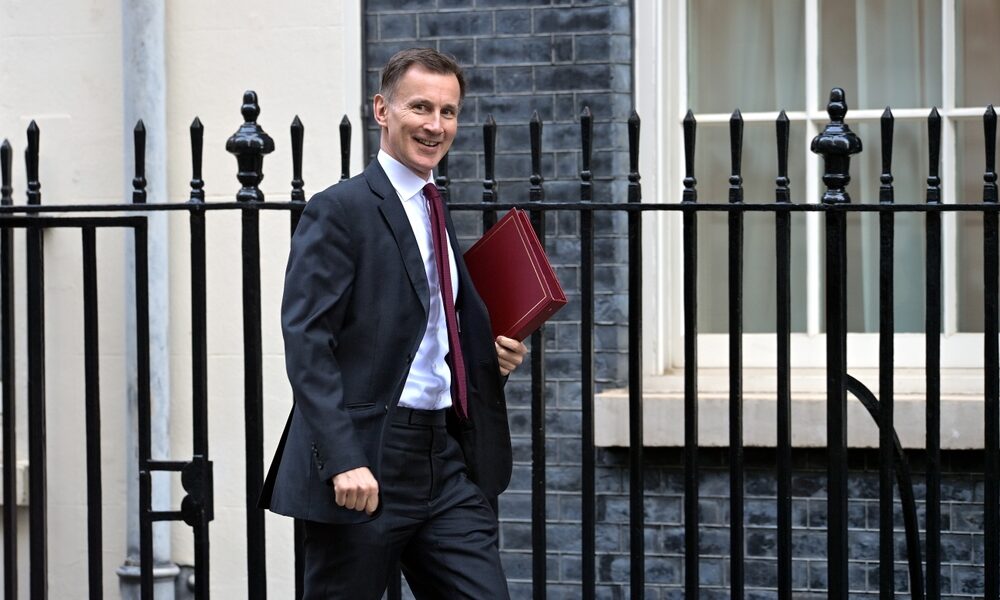Budget 2024 a ‘missed opportunity’ as Chancellor snubs the EV sector
UK Chancellor Jeremy Hunt has been criticised for failing to do more to encourage the uptake of electric cars in his Budget statement.
Despite industry leaders proposing a number of approaches to make EVs more attractive to drivers, Hunt largely ignored the EV sector in his statement.
The Chancellor did announce that he was once again freezing fuel duty on petrol and diesel. However, he maintained VAT on public charging at 20% – a key issue for campaigners.
The Chancellor said he would maintain the 5p per litre reduction in fuel tax in order to help families and businesses struggling with vehicle running costs. However, he made no reference to calls to bring down VAT on public charging to help reduce running costs for EV drivers.
The cost of public charging rose 11% in the last year and charging providers, car makers’ representatives and EV campaigners say that a VAT reduction from 20% to 5% would help bring them down again.
Matthew Briggs, CEO at EV charge card provider, Right Fuel Card said that the Chancellor had snubbed EV drivers at a time when he should be doing more to support them.
He said: “It’s disappointing to see no change in the VAT costs associated with charging EVs in public spaces. At a time when the government are urging Brits to invest in EVs before the 2035 production deadline, it’s crucial that drivers are supported to make this change with access to more affordable public charging points.
“To install an at-home charging station Brits will need to make a serious investment, those without access to this should not be financially penalised for charging in public. Investment in electric vehicles should be rewarded as a positive step taken by eco-conscious drivers and businesses. We urge the government to rethink this and look at equalising the VAT rate to that of domestic energy costs at the very least.”
Ken McMeikan, CEO of Moto Hospitality, said the decision was a missed opportunity to make EVs even more attractive to drivers. He said: “Freezing fuel duty is good news for drivers, however it’s disappointing that the Chancellor did not go further and introduce a VAT reduction on public charging for electric cars, something we, and many others, have been repeatedly calling for.
“This is a missed opportunity to make significant strides with EV adoption as it would incentivise more people to make the switch to electric cars. Exempting public charging from VAT ensures that transitioning to EVs is more financially accessible to everyone.”
Paul Tomlinson, co-founder of EV charging firm Cord, said the government’s policy on EVs was “self-defeating”. He commented: “On the one hand they are pushing for more people to switch by mandating that manufacturers bring in a certain number of EVs every year, but with the other they are spending billions to subsidise petrol and diesel use.
“If the Government is serious about encouraging uptake it could do far more to address the high up-front costs of EVs with a discount on VAT when buying a car, or look to remove VAT entirely from home charging of EVs.”
No new incentives
The Society of Motor Manufacturers and Traders (SMMT) had called for a 50% reduction in VAT on new EVs and for the Chancellor to scrap the “luxury car tax” for EVs with a list price of more than £40,000. It argued that such moves would immediately make a new EV more attractive to buyers at a time when the government says it wants buyers to switch to electric and has introduced the ZEV Mandate to force out a minimum level of EV sales for the first time.
However, the Chancellor offered no new incentives to encourage more drivers to go electric.
James Taylor, managing director of Vauxhall, said more was needed to stop EV sales stalling. He said: “Whilst there are strong incentives for company car drivers to make the switch to electric – including for those choosing luxury vehicles – the private buyer who wants a more attainable small or family car receives nothing.
“We would call on the Chancellor to urgently set up purchase incentives to stimulate the electric vehicle market and review the unfair taxation on public charging so that the UK isn’t left behind in the race to more sustainable motoring.”
Sue Robinson, chief executive of the National Franchised Dealers Association (NFDA) echoed his views. She said: “With the Chancellor’s Spring Budget failing to mention private EV price incentives, the UK remains one of the major markets in Europe with little to offer in terms of price incentives for private buyers of electric vehicles.
“Conversely, due to strong demand for BEVs, the French government announced a temporary halt to its EV subsidised lease programme last month and will resume it again in the new year due to its success.
“The government must do more to help maintain momentum in the private BEV market and increase adoption of these cleaner vehicles across the UK.”
